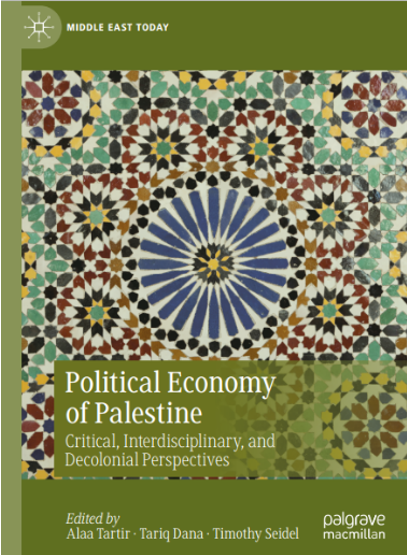Political Economy of Palestine: Critical, Interdisciplinary, and Decolonial Perspective
Middle East
Today, 2021, 335 pages, ISBN 978-3-030-68642-0
Reviewed by Firdan FADLAN Sidik
The weakness of Palestinian economy in the
eye of the Israeli and Orientalist considered as a natural cause rooted from
the genetical Arab fractured that led to the need of a superior power as
Israel. The other view on Palestine economy was that their economy was shaped
to became weak and continuously dependent on Israel. The Book edited by Alaa Tartir, Tariq Dana, and Timothy Seidel will come to the second opinion and unreveal the former opinion.
Such a deep and focus discussion work on
political economy in Palestine has been done by a sort of scholars on the book
entitled Political Economy of Palestine: Critical, Interdisciplinary, and
Decolonial Perspective. Within the decolonialization perspective, the
authors explained the discourses in the context of how did colonialization
works in the realm of economics. This paradigm brought the readers to not consider
Palestine economic issue partially, but should take into the whole paradigm of
colonialization.
The paradigm utilized by the authors are
critical, interdisciplinary, and decolonial perspective. The reader must be
critical of what Palestinian Authority embraced on political system, that is
the neoliberal agenda shaped by the external side that yields the racial
capitalism: ‘follow the money, uncover the power
dynamics’. Moreover, examining critical way should accompanied by
interdisciplinary approach to unpack the intertwining relationship of
colonialism, exploitation, nationalism, and patriarchy within the dynamics and trajectories
of capitalism. All this critical and
interdisciplinary approaches are in a boundary of decolonialization process to
challenge the logic of elimination, to give attention to the history of
erasure.
This book comprised into three cahapters.
After grounding some basic paradigm in the introduction by the editors, the
meaning of economic domination and pasification will be elaborated in the
chapter one on Contextualizing Palestinian Political Economy. The two aspecs of
colonialization: physical violence (economic domination) and symbolic violence
(economic pacification) was the framework within the Palestinian political
economy. Human dispossession and land confiscation considered as physical
violence to dominate Palestine territory. While stabilizing and normalizing the
physical violence through such a policy as Oslo-Peace process considered as
economic pasification. Both of these violences works at the same time on some
particular issues, for instance: replacing Arab countries banks, massive land
confiscation in strategic areas (fertile), controlling borders, restricted
industrial zones, and limitating communication, transport, electricity, and
daily needs. All these policies discussed in part one on Contextualizing
Palestinian Political Economy.
The next chapter delve with how the
overlapping feature between domination and pacification works on political
economy of integration, fragmentation, and inequality. This part focus on
problematizing the West-bank Israel integration through the Palestinian
interaction with the Israeli border and permit regimes. Israel created the
stategy to make Palestinian-Israel economy relation dependent. In the other
words, Israel wanted Palestinian economy fragmented, pauperized and distorted
so that Israel can intensify its colonial domination. For instance, the West
Bank-Israel trade treated by Israel as a captive market for the Israel goods
and diminish Palestinian products.
Due to the absence of Palestinian “real”
representative, the Palestine economy driven by Israel controlled authority
under the Palestinian Authority (PA) built in 1993. As stated in part three, an
agreement to govern economic and fiscal relations in Palestine was signed in
1994 named The Paris Protocol. This is the
starting point of encountering multifarious network between the Palestinian
Authority and external sides (the Israelis, the international donor community,
and self-interested regional Arab states) created the hegemony in the Occupied
Palestine Territory. This was the neocolonial approach to reach alignment
between the colonist and the native.
In the current Gaza economic situation, a mostly refugee territory
of Gaza must be seen from the settler colonialism perspective which the primary
object is the land itself, rather the surplus value within it. This is make sense since Gaza was populated
by the majority refugee that caused to the limited stock and faced
extraordinary and exhausting limitation on their reproduction and access to
land. This threatening condition worsened
by the neoliberalism mechanism by the Israel to co-opt indigenous communities invest
in a future is a taming device that divides resistant communities.
The second section explores the contrast between the prospects of
indigenous communities, characterized by non-futures, and the envisioned future
of subdued neoliberal subjects. This dichotomy is manifested through the
Palestinian Authority's influence on Gaza and Hamas, with state-like
institutions perpetuating violent methods against Palestinian protestors,
leading to divisions within the broader national resistance movement.
This book contributed much on how to read economic issue in a
global perspective and put the issue in separated factions. As monitored by the
editors, this wholehearted articles helped the public to understand not only
what they are but how they come to be. A great achievement could not be
prepared in a short period. By looking further into a deep analysis, one can reach
a comprehensive understanding.
However, research can never complete a worldwide puzzle. This book
still needs a further completion by adopting the opposing argument relating to
the Palestine economic issue. The opposing view stated in this book is only a
single fact that Israeli scientists justify the inferior status of Palestine
economy by emphasizing the backwardness of Arab cultural and social tradition. This
judgement used by Israeli to smuggle economic domination policy.



Comments
Post a Comment